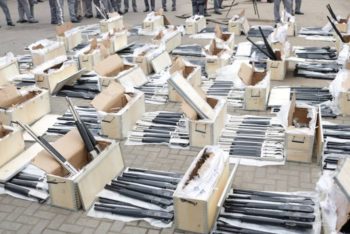The recent seizure of container load of 661 pump-action rifles by operatives of the Nigeria Customs Service (NCS) at the Mile 2 area of Lagos last month has again brought to the fore the gnawing fear in the minds of many Nigerians of the porous nature of the Nigerian ports and the security implication for the whole nation.
Beyond the outrage and condemnation that greeted the discovery, Nigerians are worried that the issues arising from the seizure of such dangerous weapons may as usual be swept under the carpet and the culprits let of the hook despite official pretensions to the contrary.
Although the Comptroller General of the NCS, Hameed Ali, has assured that the importer, the agent and the custom officers involved are in police custody, many believe that these individuals are mere fronts for some high powered individuals who may be sacred cows in the society.
Regardless of whose ox may be gored, all people involved in the importation of the arms consignment should be brought to book. That is the only way efforts by the Nigerian Customs so far, which has also been in the eye of the storm, would not end up a wild goose chase.
While security remain a burning issue in our polity on the back of the recent internecine but rather deadly wars threatening the peace of the country, it has become obvious that the take-over of scanners from the service providers by the Nigerian Customs Service is deadly mistake.
Experts believe that the container load of arms and other contrabands found their way out of the port due to the dearth of functional scanners.
The Customs Comptroller General, Ali, said at the heat of the arms seizure that most of the scanners at the ports are not working, and that due to lack of funds Customs has not been able to replace them. He promised they would be replaced before the end of the first quarter of this year.
This is not the first time the CGC has given assurance about the replacement of the scanners since he was appointed to office more than 15 months ago.
The Federal Government had on December 2013 transferred the responsibility of providing destination inspection service at the country’s ports from contracted scanning service providers (SSPs) to the Nigeria Customs Service following the expiration of the Destination Inspection Contract Agreements between the Federal Government and SSPs.
The Minister of Transport, representing the Federal Government, had specifically indicated the takeover over full processing of all import transactions to Nigeria in accordance with the amended import guidelines of the Destination Inspection Scheme effective December 1, 2013.
This transfer of functions signaled the dearth of scanners at the port creating an unsightly situation that has allowed all kinds of illegitimate consignments pass through the ports untracked. Although the NCS has since adopted 100 percent examination it has not created the needed impact.
Available indices show that the problem with the scanners goes beyond providing the funds and replacing them. Most stakeholders believe that NCS lack the needed expertise to handle them.
The current fear is that if the scanners are replaced, the NCS does not have the right skill to operate them. Besides, due to the present state of power in the country, it may lack the funds to power the scanners daily considering bureaucracy in public service. Equally, the NCS has shown so far that it lacks maintenance culture, which led to the collapse of the former scanners.
Considering the reality on ground, we believe that the way out is to bring back the Service Providers even as Nigeria works its way out of recession to avoid future crises at the ports.
It is quite sad that the over $120 million goods inspection equipment inherited by the NCS about three years ago from the service providers are now malfunctioning, making it mandatory for goods to be inspected manually at the ports and border posts in the country.
The scanning machines were inherited from Cotecna Destination Inspection limited, Global Scan Systems and SGS scanning Nigeria Ltd, which carried out destination inspection operations at the gateways, on contract basis for about eight years, before the service was transferred to the Nigeria Customs Service.
Each of the service providers who operated in different locations nationwide were allowed to put in place basic infrastructure and manage them for seven years before handing them over to the Federal Government, through the NCS.
Before the termination of the inspection contract by the Federal Government about three years ago, Cotecna, which operated in the Lagos ports, said it was bestowing $70 million worth of equipment at various ports for scanning of goods arriving at port to facilitate the process of clearing.
Many of these scanning machines have stopped functioning, compelling the Nigeria Customs to resort to physical examination of all containers, a process, which many have described as ”cumbersome and time wasting.”
Copyright Ships & Ports Ltd. Permission to use quotations from this article is granted subject to appropriate credit given to www.shipsandports.com.ng as the source.
